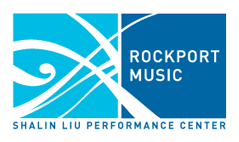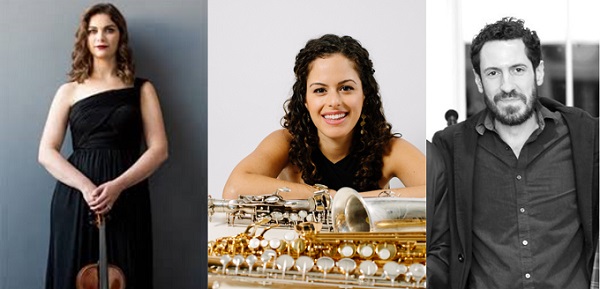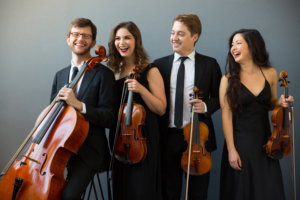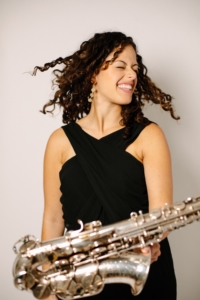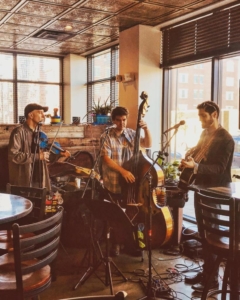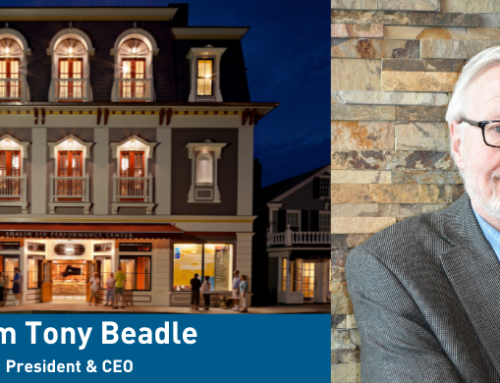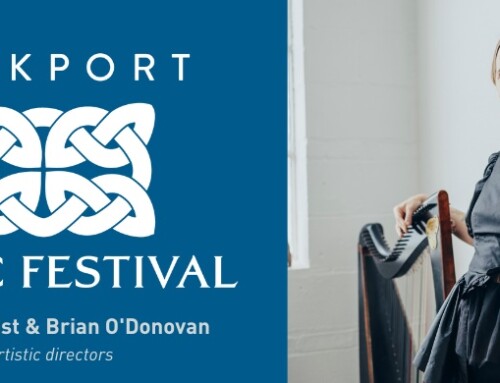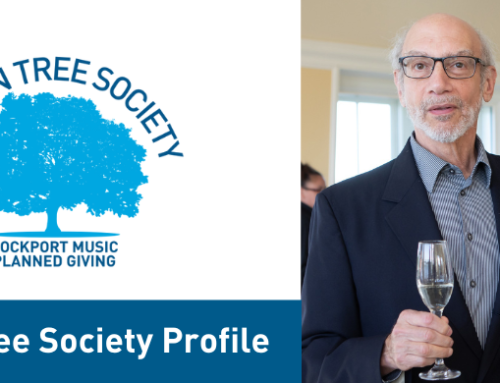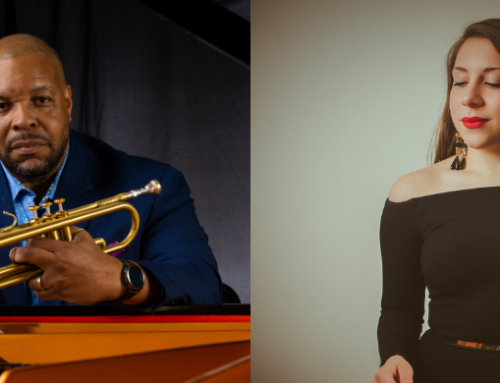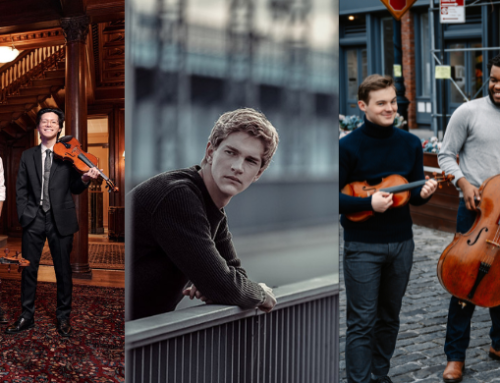As painful as it is to miss out on hearing live music this spring and summer, it’s even more painful for the musicians whose livelihood depends on performance. We talked with three musicians about their quarantine life: Caitlin Lynch, violist in A Far Cry chamber ensemble and the Aeolus String Quartet, Alexa Tarantino, saxophonist (Alexa Tarantino Quartet) and Director of the Rockport Jazz Workshop, and Joe Wilkins, singer-songwriter, guitarist, and bandleader of the Rum Runners String Band. They all participate in what is known as the “gig economy,” which for musicians is essentially the non-salaried freelance work of performances and lessons.
How much have things changed for you these last few months? Are you able to piece together some form of income through your music?
Caitlin Lynch: Nearly everything has changed in the last few months. Most of my income comes from performing, which of course, in the traditional sense, is not happening right now. Thankfully, I have been able to continue teaching over Zoom. A Far Cry has worked hard to compensate the Criers for our co-Artistic Directorship through this chapter, and a couple of presenters have generously paid concert fees for cancelled performances. I went from being on the road pretty much constantly to rarely leaving the house. My biggest travel these days is a walk around the block.
Alexa Tarantino: Things have changed drastically for me as a touring performer and educator. A major West Coast tour of mine was cut short just before the mandated lockdown, and all work through August 2020 has been cancelled. I’ve had contracts as far out as February 2021 cancel due to the pandemic. Due to the nature of our performance contracts, freelance musicians do not typically receive any type of payout in this situation. The summer is an especially busy time for jazz musicians as it is the season of summer jazz festivals and jazz camps. Currently I am working to cover my expenses by performing a live-stream concert every Sunday night with 25% of proceeds donated to Emergency Relief Funds, offering online private teaching and group education opportunities, applying for artist grants, and doing remote education or recording work for various organizations/institutions.
Joe Wilkins: In terms of music income, I’ve been teaching online through Zoom. It’s a learning curve for sure… I use a lot of visual aids when teaching – diagrams and playing recordings and whatnot – and attempting this in Zoom is claustrophobic and tedious – so, to be honest, I’m not loving teaching online, as of yet anyway. I have played a couple of online gigs through Facebook Live, and a live-streamed church service gig but other than that, performances are completely on hold for the time being. I suspect however that online shows and live-streams from venues may become much more of a “thing” as venues adapt to the changing environment.
Have you had to find other non-music work?
CL: My husband is working from home right now, and my job, other than working on AFC’s Season 14 planning, doing virtual projects with my quartet, and teaching online, is to keep up with our two kids. With no school and no babysitters and two kids under the age of four, it is a full-time job I’m grateful to have!
AT: No, although I have had to expand my offerings underneath my musician umbrella. For example, I now advertise career consulting sessions for students and freelancers, etc.
Are you getting together with anyone to play, at a distance, or via zoom?
CL: Yes! There has been a lot of experimenting with the technology. The latency is obviously an issue that is difficult to overcome with streaming platforms. That said, with a very complex setup and a lot of help from some fantastic and determined professional audio engineers, I was able to play with a fellow Crier live over the internet once, which felt magical. That was a rare opportunity, though. Both A Far Cry and my quartet have done projects involving layering of recorded voices. I was really surprised by how emotional it has been to do this. Three months ago I might not have given this approach the time of day. But right now, it’s all we’ve got. Playing “with” each other through these recordings has been powerful and so very comforting. It’s something, and I’ll take solace in that.
AT: The quality and technology is not strong enough to play with people in real time over the internet…This is not my main focus, since it’s so different from what we really do – it is tough to recreate the spirit, the human connection, and the musicality of live performance.
JW: There is too much of an audio lag unfortunately to accomplish the zoom playing with bandmates. Someone who develops an app without a discernable lag would make a lot of money right now! It is totally possible however, to record songs (or an entire album) completely separated from one another – record a track – email to a friend- they add their instrument and send it back and so on/so forth until you sum it all up into a song that plays like everyone was in the same room! Fun stuff. Just now learning how to layer multiple videos together for this purpose!
Has all the extra time provided any inspiration for composing?
AT: I wish I could say yes! I have not been able to use the time at home for practicing and composing as I would have liked. There is so much marketing, communication, and administrative work that goes into the online initiatives that are providing some income. Unfortunately that has to take the priority right now. However it has allowed me to brainstorm new ideas either for composition, ensembles, education. I hope to carve out some time to work on these ideas soon.
JW: I have indeed been writing a lot. I would say having the time and space to really stretch out and write, without a time crunch or any pressure really, has made the process fun again for me and a lot of ideas are in the works for new tunes. It is tough not having the inspiration of my fellow musicians playing by my side, but I try to keep up with everyone and what they’ve been doing.
What’s been the most difficult thing about all this for you as a musician/artist?
AT: I initially thought I would use this quarantine as an “artist retreat” period where I could hibernate and practice, compose, etc. Unfortunately because there’s no end in sight, it’s become a period of working to convert my brand, business, product, and audience to an online market. The positive aspect of all this is that I have never been home this much! Normally I’m taking multiple flights a week and playing or working with students across the country. I look forward to getting back out there and making music for, and with, others.
JW: The most difficult thing for me is not performing in front of people! My inspiration comes mainly from the friends and fans of my music, the people who support what I do and are an ever-present part of where my inspiration comes from and also what cover tunes I end up playing – those live moments with the audience reacting and your band all around you – there’s nothing like it. Without the community, it’s been really lonely some days and I find myself playing less and less. Just today I decided to really get disciplined and practice a bit everyday – even with no gigs in sight.
CL: Beyond the lost work, the most difficult thing was the feeling of helplessness at the beginning of the stay at home orders. Never has there been a time in my life when I couldn’t use music to try to make a difference in a time of difficulty. I have spent a lot of time playing in hospitals, hospices, retirement homes …and to feel like there wasn’t a way to come together for these communities during this crisis has been difficult. Thankfully there have been vast improvements on that front as unique opportunities have arisen for A Far Cry musicians to bring music to patients and the medical community through technology.
The other ongoing difficulty, of course, is missing the musical connection. That collaboration, that empathy, that electric, indescribable energy of live performance and responding to others in the moment. My hope is that audiences are missing and craving it as much as the musicians are, and when we have found a safe way out of our current situation, that we’ll all be equally hungry for it. I have a feeling we’ll all return to live performance (for live audiences) with a deepened appreciation – there is no question in my mind it’s going to be intense and magical.
